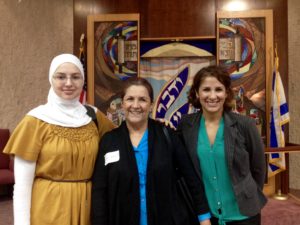Interfaith Breakfast

On May 18, I attended an Interfaith Breakfast sponsored by Habitat for Humanity at Temple Torat Emet in Boynton Beach. We sang songs, ate delicious bagels, and heard prayers from leaders of B’nai Torah Congregation, the Bahá’í community, Southern Palm Zen Group, the Islamic Center of Boca Raton, and St. John Missionary Baptist Church. I was one of two Presbyterians among the fifty people who attended. Afterward we had a tour of the Temple and got to examine their Torah. It was a pleasure to talk with Bassem Alhalabi and his daughter Layla, on the left above. Bassem is a professor of computer science at Florida Atlantic University; Layla is in law school at Florida International University. Both are active in the Islamic Center of Boca Raton.
All my life I have been curious about world religions. In high school, I was so smitten with Buddhism that I wrote in my senior yearbook that my ambition was “to attain Nirvana.” Sometimes I think I have! I didn’t begin to explore Islam until the spring of 2001. On our trip to the Middle East, Lilli and I visited two mosques. At the one in Beirut, a man who was reciting the Qu’ran became “distracted,” he said, by our female voices. We were quickly directed to the small area upstairs reserved for women. At the much-grander Dubai mosque our guide was a woman from Littleton, Colorado, who had met a United Arab Emirates native at the University of Colorado, married him and converted to Islam. She stressed the convenience of using a hijab to cover her jeans whenever she went out, and said she felt safer in Dubai than in Littleton, where a horrific school shooting had occurred two years before.
In September of 2001, just after 9/11, our Methodist minister, Dr. Larry Buxton, and Steve and I, as Lay Leaders, were invited to Dar al-Hijrah Mosque in Falls Church, Virginia. Like Muslims across the country, this congregation was reaching out to the public in an effort to forestall the kind of retaliation that occurred in Texas (see The True American) and several other states. When I asked the Imam, Anwar al-Awlaki, what change in US policy he would like to see, he answered that our country’s preference for Israel over Palestine was the root of Arab anger and unrest. Later al-Awlaki became more radical. In November 2009, I was surprised to hear that this Imam, whom I had heard advocating peaceful co-existence in 2001, was shown to have directly encouraged Nidal Malik Hasan, the man who killed 13 and injured 30 in the Ft. Hood (Texas) mass shooting. In September 2011, al-Awlaki was killed in a US drone strike, as was his 16-year old son two weeks later.
As the US became embroiled in wars in Afghanistan and Iraq, I read several books about Islam. I wanted to understand the religion of more than 1.6 billion people and I wanted to be able to convey the Five Pillars of Islam—shahada (confessing belief in Allah and Muhammad, the prophet), salat (prayer), zakat (almsgiving), sawm (fasting, especially during Ramadan), and Hajj (pilgrimage to Mecca)—to my high school Sunday School class. I wanted my students to see that the habits and rituals of Christians and Muslims have much in common, although Christians seem more inclined to eat than to fast.
After learning more about Buddhism from Peijing Teh, the Rice intern from Singapore whom we hosted the summer of 2004, I volunteered to be Cherrydale Methodist’s representative to the Arlington Interfaith Council. The Council was founded in 1966 by various denominations to form a safety net for people in need. There are relatively few Buddhists, only one synagog, and no mosques in Arlington, but the Council supported the Ramadan Baskets project of the Muslim Women’s Coalition of Greater Washington. Their leader, Pakistan-born Uzma Farooq, invited us to the screening of a film at the National Cathedral that depicted her faith’s reverence for Mary and her son, Jesus, both of whom appear in the Qu-ran. Then in March 2012, I attended an interfaith prayer breakfast at Uzma’s home that highlighted songs and poems from various faiths and made me ever-alert for future opportunities to gather in prayer across denominational boundaries.
By 2015, Arlington County’s safety net was reliable and substantial; the Arlington Interfaith Council, on which I had served for six years, disbanded just before we moved to Boynton Beach FL. When I found that our newly adopted First Presbyterian Church of Delray Beach supports interfaith activities, I felt right at home. In Palm Beach County, which is far more religiously diverse than Arlington County, the emphasis seems more on learning about and understanding each other, but as was the case in Arlington, member congregations provide funds and volunteers for Habitat for Humanity, Caridad Center, Family Promise and other “helping hands” agencies. In addition to two interfaith breakfasts, I have twice attended the Interfaith Cafe that meets one evening each month. One magical moment was receiving a poem from Jane, a Zen Buddhist. It expresses my lifelong desire to be “part of something greater…connected to the universe.”
Reach Out and Bless Someone!
Next time you’re feeling lonely,
Next time you’re feeling blue,
Remember to reach out my friends–
Someone else is lonely, too.
In this great wide world out there,
There are many who share your plight.
So don’t give up and don’t give in—
Reach out with all your might!
You are part of something greater,
You are part of something vast!
Connected to the universe,
And All within its mass.
So take a step outside yourself,
Where loneliness resides—
To reach out to your fellow man
In the space where Love abides.
And you will see you weren’t alone
That others struggle too,
The world was waiting for your touch
and the blessing that is YOU.
Copyright Rebekah Ann Stephenson 2013
weliveinspired.com
Leave a Reply